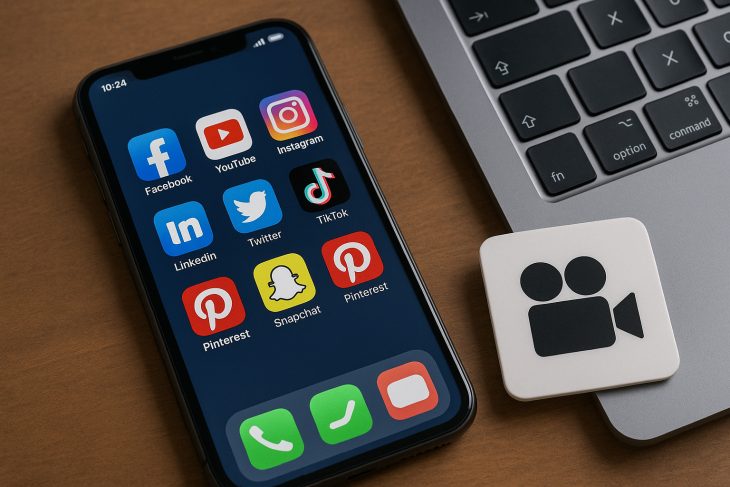
The rise of social media has reshaped how people connect, communicate, and consume content. From the humble beginnings of text-based forums to the global dominance of visual and video platforms, the journey has been transformative. Here are 30 key facts organized by category to understand this massive shift.
Early Days of Social Media
1. Six Degrees (1997)
The first true social network, Six Degrees, allowed users to create profiles and friend lists.
2. Friendster Paved the Way (2002)
Friendster introduced the idea of social networking to the masses before fading due to technical issues.
3. MySpace Domination (2003)
MySpace became the most visited social networking site in the mid-2000s, giving users customizable profiles.
4. LinkedIn for Professionals (2003)
LinkedIn carved out a niche by focusing exclusively on professional networking.
5. Facebook’s Ivy League Beginnings (2004)
Facebook started at Harvard and expanded quickly to other universities before opening to the public.
Growth of Visual Platforms
6. YouTube Launches Video Sharing (2005)
YouTube introduced user-generated video sharing, now a global entertainment powerhouse.
7. Twitter’s 140 Characters (2006)
Twitter gained fame for its short, text-based updates, becoming a news and opinion hub.
8. Instagram Sparks Photo Sharing (2010)
Instagram focused solely on photo-sharing and aesthetic visuals, redefining social media content.
9. Pinterest and Curated Boards (2010)
Pinterest allowed users to save and organize images, recipes, and ideas on virtual pinboards.
10. Snapchat Introduces Disappearing Content (2011)
Snapchat’s temporary photo and video model appealed to younger audiences seeking privacy.
The Video Content Boom
11. TikTok Merges Music and Video (2016)
TikTok combined lip-syncing, dancing, and comedy into short-form video, skyrocketing in popularity.
12. Facebook Adapts to Video (2014)
Facebook shifted focus to video content to compete with YouTube’s dominance.
13. Instagram Stories Compete with Snapchat (2016)
Instagram added Stories, a format pioneered by Snapchat, to keep users engaged.
14. YouTube Shorts Launched (2020)
YouTube responded to TikTok by introducing its own short-form video feature.
15. Video downloaders emerged
As users sought to archive or view favorite clips offline, tools to save social media videos became widespread.
Monetization and Advertising
16. Facebook Introduces Ads (2007)
Facebook monetized its vast user base through targeted advertising.
17. Instagram Becomes an Ad Powerhouse (2015)
Instagram started integrating ads directly into user feeds.
18. Influencer Economy Emerges (2010s)
Platforms like Instagram and YouTube gave rise to influencers who monetize their followers.
19. Twitter Tests Monetized Content (2021)
Twitter experimented with Super Follows, allowing creators to charge for premium content.
20. TikTok Creator Fund (2020)
TikTok launched the Creator Fund to financially reward content creators.
Cultural and Societal Impact
21. Social Media and Political Movements
Platforms played major roles in global movements such as the Arab Spring and Black Lives Matter.
22. Hashtag Culture Was Born
Twitter popularized hashtags, now used across platforms for trends and activism.
23. Fake News Concerns
Social networks faced criticism and regulatory pressure over misinformation and fake news.
24. Rise of Social Shopping
Instagram and TikTok integrated shopping features, blending entertainment with e-commerce.
25. Mental Health Debates
Studies highlighted links between social media usage and mental health issues, prompting feature changes.
Platform Expansion and Innovations
26. Facebook Acquires Instagram (2012)
Facebook bought Instagram for $1 billion, expanding its social media empire.
27. Google+ Tries and Fails (2011–2019)
Google+ aimed to challenge Facebook but failed to attract active users.
28. Clubhouse Brings Audio-Only Networking (2020)
Clubhouse introduced live, drop-in audio chats, briefly becoming a viral hit.
29. Threads by Instagram (2023)
Threads was launched by Instagram to offer a text-based alternative to Twitter.
30. Metaverse Ambitions
Meta (formerly Facebook) announced plans to focus on virtual and augmented reality experiences.
Reflecting on the Social Media Journey
Social media platforms have transformed from basic networking tools to complex ecosystems influencing culture, politics, business, and personal lives. The constant push for innovation has led to fierce competition and the creation of tools like video downloaders to meet evolving user demands. As new trends emerge, social platforms continue to adapt, shaping how information and entertainment are shared worldwide.
Was this page helpful?
Our commitment to delivering trustworthy and engaging content is at the heart of what we do. Each fact on our site is contributed by real users like you, bringing a wealth of diverse insights and information. To ensure the highest standards of accuracy and reliability, our dedicated editors meticulously review each submission. This process guarantees that the facts we share are not only fascinating but also credible. Trust in our commitment to quality and authenticity as you explore and learn with us.
